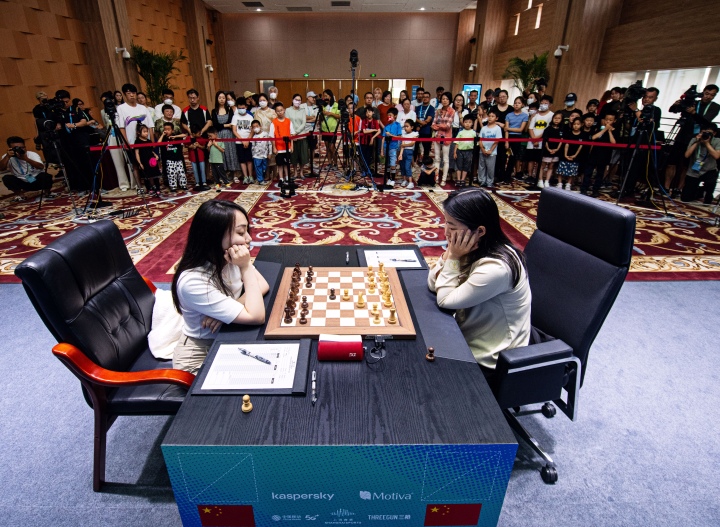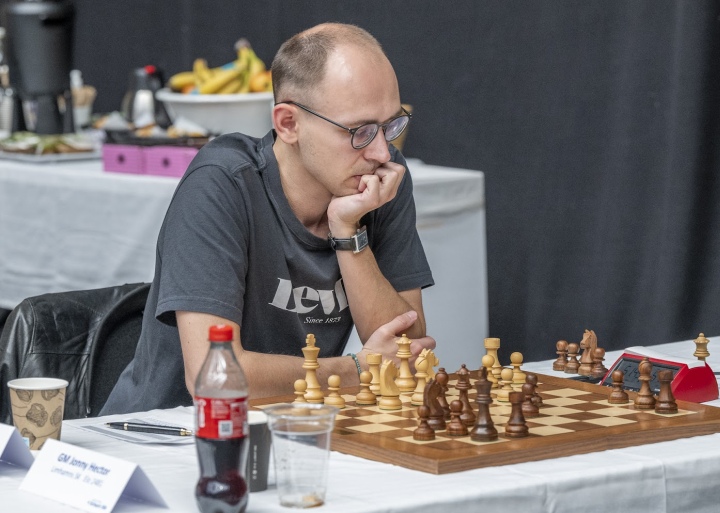Infinite Chess Project: 3rd stage of ends with a Zoom meeting

The final online meeting with partners of the Infinite Chess project (3rd stage: February – June 2023) will be held on 15th July 2023 at 11:00 CEST. This meeting, organized in cooperation with FIDE Social Commission, is open to the project partners and everyone interested in the topic. The main goal of the meeting is to share the outputs of the project, check progress and follow up on outstanding issues. Schedule of the meeting: 11:00 – welcome speech by Dana Reizniece-Ozola, Project supervisor, FIDE Deputy Chair 11:05 – welcome speech by Anastasia Sorokina, Leader of the project, FIDE WOM Chair (recorded video) 11:10 – Viesturs Kapce – chess coach, Latvia 11:15 – See, Swee Sie – national instructor, Malaysia 11:20 – Kamal Daodi – chess coach, Morocco 11:25 – Kanthi Sarjoo – speech-language pathologist, South Africa 11:30 – Sinem Çağla Gündoğan – chess coach, Turkey 11:35 –Sharon Whatley – chess coach, Gibraltar 11:40 – Questions Zoom link to join the meeting:us02web.zoom.us/j/89634977372 Meeting ID: 896 3497 7372 About the Infinite Chess Project FIDE’s INFINITE CHESS Project aims to increase knowledge and awareness of chess for children with autism spectrum disorder (ASD), give practical advice to teachers and parents, study the benefits of introducing them to chess and develop various teaching methods. In 2019, the Infinite Chess Project started in Belarus when the Belarus Chess Federation launched four pilot groups of 4 people each. In January 2021, a pilot project was launched in 6 countries: Spain, Turkey, France, Gibraltar, South Africa and Norway. The project is very much in line with FIDE’s strategy of promoting inclusivity and equity and the recently approved corporate social responsibility guidelines of FIDE. The 3rd phase of the pilot project (February-June 2023) included simultaneous implementation of the chess training for 120 kids children with autism spectrum disorder, based on the methodology developed by FIDE. The project is currently running in 12 countries: Spain, France, Latvia, Gibraltar, Albania, South Africa, Morocco, Malaysia, Turkey, Taiwan, Cyprus and Mongolia. It is co-financed by the IOC’s Recognized International Federations’ Development Program. As a next step of the project development, FIDE is planning to expand the implementation of the program in the African and American continents.
3rd Intercontinental Online Chess Championship for Prisoners announced

The International Chess Federation is excited to announce the third Intercontinental Online Chess Championship for Prisoners, to be held from October 11-13, 2023. As a part of the Chess for Freedom program and the continuation of the International Championship among prisoners first held back in 2019, the event aims at introducing chess as a tool for education and social inclusion in prisons worldwide. The championship, organized by FIDE and the Cook County (Chicago, IL, USA) Sheriff’s Office and hosted by Chess.com, is open for teams made of 4 players in three categories – men’s, women’s and juvenile correctional facilities. “We started the Chess for Freedom program in May 2021 with an exhibition online tournament with four participating countries. Since then, the event has rapidly grown, as in October 2022, the Intercontinental Online Chess Championship for Prisoners boasted 85+ teams from 46 countries, becoming the largest event of its kind. And we will keep growing this year, providing an opportunity for a bigger number of inmates to play chess with their peers across the globe,” said FIDE President Arkady Dvorkovich. “I am pleased to continue the special partnership between my office and FIDE by hosting the third Intercontinental Online Chess Championship for Prisoners at the Cook County Jail,” said the Cook County Sheriff Thomas J. Dart. “I look forward to welcoming returning participants from chess communities worldwide, as well as teams who will be joining us for the first time.” Deputy Chair of the FIDE Management Board Dana Reizniece-Ozola added that FIDE’s role is not limited to hosting chess events: “It’s not only about organizing tournaments. Our plans include the development of the training methodology, awareness-raising activities and post-incarceration educational programmes. We are inviting new countries to join us, even if they are not running chess programs in their prisons yet. We are ready to assist with any advice, sharing best practices, and proving that chess is an excellent educational tool for everyone.” The tournament will be played online and streamed on FIDE’s Youtube channel. The broadcast will not only cover the games but also include interviews with special guests of the event – FIDE officials, government officers, members of the penitentiary administration and policymakers sharing the best practices of introducing chess to inmates, as well as former convicts proving from their own experience the positive impact of the game on prisoners. Each country can have up to three teams in the event: – main team – team representing a female correctional facility with all four female team players – team representing juvenoid correctional facility (under the age of 20). The participating countries can also submit more teams to the waiting list as the tournament organizers might need additional teams to complete the 8-team field for each group. Each correctional facility shall submit an application via an online registration form: forms.office.com/g/xPqGaWbR4Q The registration deadline is September 22, 2023. There is no entry fee. Tournament regulations (pdf) Contact person: Mikhail Korenman, Chess Program Coordinator at Cook County Department of Corrections,FIDE International Chess Organizer and Member of FIDE Social Commission E-mail: Mikhail.Korenman@ccsheriff.org Tel.: 1-785-906-0402 About the Chess for Freedom program The rights and opportunities of self-realization and development for people in imprisonment are essential prerequisites in order to consciously build their future after liberation. Access to training and learning, as well as to quality ways of socializing, could give a strong motivation to change for the better. To support and promote this line of work, FIDE and the Cook County Sheriff’s Office (Chicago, USA) have launched the “Chess for Freedom” program. This project kicked off in May 2021 with an online conference and an exhibition tournament with four participating countries. Later on, in October 2021, the first Intercontinental Online Chess Championship for Prisoners – a much larger competition with the participation of tens of prisons – was held. The 2nd edition of the event, organized in October 2022, attracted more than 85 teams from 46 countries. As a next step, in May 2023, the Chess for Freedom Conference was organized in Chicago, USA. It attracted 40 participants, including FIDE officials, representatives of national chess federations and experts involved in chess programs for inmates, who discussed concepts and approaches to using chess as a rehabilitation tool for incarcerated people. In recent years, we have witnessed the successful introduction of chess in prisons through different educative programs in many countries. They demonstrated that chess improves behaviour, helping to reduce inmate violence and developing communication skills while promoting the positive use of leisure time. Chess also drastically improves decision-making and fights depression, stress and anxiety. To learn more and join the project, visit the official website: chessforfreedom.fide.com
Promoting Africa: CIE Awareness Campaign launched in Zimbabwe and Nigeria

FIDE EDU Commission, together with the Chess Federations of Zimbabwe and Nigeria, has kickstarted Promoting Africa: CIE Awareness Campaign project involving Preparation of Teacher (PoT) training and presentations for educators and decision-makers on how to implement chess as an educational tool in schools and universities. Spearheaded by Jerry Nash, Chairman of FIDE EDU, and Anzel Laubscher, EDU Commission member, this joint effort is funded by the national federations, FIDE EDU, and a generous grant from the International Olympic Committee (IOC). On arrival to Zimbabwe, Jerry and Anzel had a productive meeting with a group of local head teachers, who were receptive to the idea of chess as an educational tool in the classroom. They eagerly awaited the first PoT course, which runs from July 11-13, with around 60 participants. On Wednesday, July 12, Zimbabwe Chess Federation hosted a corporate simultaneous exhibition at Organikks, which was a black-tie event. GM Nigel Short conducted a simul against 30 participants from corporate sponsors. Many high-profile guests attended the event, including several dignitaries such as the Minister of Sport, Minister of Education, Sport and Recreation Commission Chairman, Sports and Recreation Commission Director General, and diplomats from US and UK embassies. On Friday, July 14, the team will fly out to Victoria Falls and then on Sunday, July 16, Jerry and Anzel will set out for Lagos, Nigeria, to run the second PoT course and promote Chess in Education via several social engagements. FIDE Chess in Education Commission focuses on expanding the global outreach for chess in education. Since children enjoy learning through play, chess is a powerful educational tool for developing and honing various intellectual skills. Chess can be taught as a stand-alone class or integrated into other subjects through exercises, investigations, and chess-related activities. Game-based education engages students and improves the quality of their learning experience. Jerry Nash has been involved in the field of chess in education for over 20 years providing training for educators around the world on how to teach the game and use it to introduce skills development. WIM Anzel Laubscher is a practising Advocate of the High Court in South Africa. She has run numerous FIDE teacher training courses all around Africa. She is the co-author of the new Preparation of Teachers course that awards the School Instructor title to successful participants.
WWC Match 2023: Last game in Shanghai ends in a draw

The defending Women’s World Champion fails to score a victory in her native city as Lei leads with 3.5:2.5. Game six saw a fast draw as both players seek respite ahead of the second part of the match which will take place in Chongqing With 12 games scheduled for the classical part of the match, game six in the match marked the halfway point. It was also Ju’s last chance to score victory in her native city, as the second part of the match will take place in the central-Chinese city of Chongqing, Lei Tingjie’s home town. Following a loss in game five and with two free days ahead, defending Women’s World Champion Ju Wenjun was looking for either a comeback or some respite, going into the second part of the match. While in the past five games Lei had typically been the one to set the opening tone, this time Ju (playing as White) made a surprise. In the Queen’s Gambit, she played the early 3.cxd5 but it all came down to a very popular line of Tarrasch Defence. The sides blitzed the moves and quickly exchanged the queens and a pair of minor pieces. The two reached a seemingly calm but complicated middlegame with a minimal edge for Ju: she had a pair of bishops and slightly more initiative. Also, she did not put herself at risk of losing and had a small advantage which she was happy to play on, as in the previous games. Facing threats luring under the calm waters, Lei swam confidently, quickly developing her pieces and forcing exchanges to simplify and hold an even position. Despite a pair of bishops and some minimal initiative, Ju could not develop anything concrete as Black countered very well. As the game progressed more pieces were traded and the two entered a drawn rook and knight endgame. On move 48, after three hours of play, the two agreed on a draw. Summarizing the first six games, Ju Wenjun said that the “overall quality was not bad, but I hope that in the second part of the match, I will improve my chess”. Lei was asked whether the fact that the match is moving to her home city of Chongqing will have any impact on her. “As a professional player you just focus on chess. I will be playing in my hometown, but playing in Shanghai was also good. Nothing will change for me”. The Chinese WGM Gu Xiaobing asked the players how much truth they tell in press conferences. World Champion Ju claimed to tell “99 percent,” while Lei was coy, saying she shares “about 50 percent.” Ju’s answer was a bit surprising, given that she is the world champion. But perhaps she is simply used to being in the spotlight and knows how to handle the media without raising much attention. With six more games set to take place, the players will now relocate to Chongqing, the native city of Challenger Lei Tingjie. The match will continue on Saturday, 15th of July. The starting time of the games remains the same as China has only one time zone – 3 PM Local Time in Chongqing (GMT +8). Here follows a closer look at game six of the match: The first move today was made by Zhang Yi, Director of the Youth Sports and Education Department in the Shanghai Administration of Sports and Ma Jiabin, Director of Jing’an District of the Shanghai Administration of Sports. As in the previous five encounters, game six brought another opening surprise. While it was usually Lei who was setting these up and gaining an advantage, this time, Ju took the unexpected path in the opening. Following 1.d4 d5 2.c4 e6, she decided to take on d5, preventing Lei from deploying the openings from previous rounds. Lei went for the Tarrasch defence – as in game two, but with a different setting, due to Ju’s 3.cxd5 move – and both players were blitzing the well-known moves. Soon, a pair of light pieces and the queens were off the board. Here the Women’s World Champion castled long, making the first original move in the game. Ju’s opening choice and approach were branded as “very clever” by GM Xu Yi, who is part of FIDE’s commentary duo, together with GM Alik Gershon. “White has a pair of bishops and a more enjoyable position… From the previous games, we saw that Ju Wenjun can play these positions with tiny advantages, and the position doesn’t put her at too much risk”, Xu noted, as both he and Gershon agreed that losing today would be “a disaster” for Ju. Both sides have now finished development. White has a minimal edge but the position is roughly even. 20.Bg5 After this move, White lost even the tiny edge she had before. Somewhat better options were Bc1 or Nh4. Indeed after 20…f6 21.Rxd8+ Rxd8 22.Bd2 Bd3 Black had no problem whatsoever. Lei intended to exchange a pair of bishops and further simplify, heading for a draw. Ju refused at first, but a few moves down the road, she accepted the inevitable. It is difficult to see how White can improve her position here. 27.Bc5 is met with 27…Nf5, while in the line 27. Be2 Bd3 28. Bd1 Nd5 Black is also fine, thanks to his active pieces. 27.Bd6 Rd7 28.Rxe4. With this move, Ju admitted she could not make progress keeping her pair of bishops on the board. The only thing White has in her favour after trading the bishops is Black’s slightly extended queenside. On the other hand, Ju’s position on the kingside was not flawless. The Women’s World Champion was going for a very long technical squeeze, hoping to outplay her opponent, but realistically speaking, the position did not offer much, and Black faced no real problems. The position is even. The bishops are off the board, and the pressure of the queenside for Black has eased while White holds on the kingside. After exchanging the rooks, the two continued testing each other in a knight endgame, but
FIDE World Championships 2024 Call for Bids: Two days to deadline

FIDE Events Commission would like to remind to all National Federations that the procedure “Call for Bids FIDE World Championships 2024” will be ended for all bidders on July 14 2023. There are 11 competitions on the list: World Junior U20 Chess Championships 2024 World Senior Team Chess Championships 2024 World Senior Chess Championships 2024 World Youth U14, U16, U18 Championships 2024 World Amateur Chess Championships 2024 World School Chess Championships 2024 World Cadet & Youth Rapid & Blitz Championships 2024 World Cadet U8, U10, U12 Championships 2024 World U20 Junior Rapid & Blitz Championships 2024 World Schools Team Chess Championship 2024 World Cup U8, U10, U12 2024 (New) Dear bidders, please pay attention: FIDE Events Commission has changed its approach to accepting and processing bid applications. From now on it is stricter and more formalized. More details about the procedure including the Bidding Federations Responsibility, Bid Form and Bid Form Annex, Bid and Deposit Fees you can find HERE.
WWC Match 2023: Lei Tingjie takes the lead with convincing win over Ju Wenjun

In a complicated game in round five of the Women’s World Championship match, challenger Lei Tingjie defeated the reigning Champion Ju Wenjun The 26-year-old challenger seized the initiative early on and gradually tightened her grip on Ju Wenjun’s subdued defences. This was the first game in the match where one side had a clear advantage. Once again, Lei surprised her opponent by choosing the Italian game instead of the Ruy Lopez she had played as White in the previous two rounds. In a dynamic game, Lei managed to achieve more space across the board and exerted greater control in the centre and the light squares. The defending Champion Ju made a mistake on move 21, allowing White to create a strong push on the queenside – an advantage which impacted the course of the game. Although some exchanges of pieces provided Black with breathing space, the defending Women’s World Champion ended up in a passive position, desperately trying to withstand White’s squeezing. With no pressure on her back and with enough time on the clock, Lei proceeded to align her pieces and then eventually broke through in the centre with a devastating pawn push (45.e5), shattering Black’s defences. Ju spent over 22 minutes thinking about how to react. Visibly nervous, she made a bad move and found herself in a hopeless position as Lei quickly got two passers. Although Ju fought on for a little longer (having to even give up a bishop), the endgame was ultimately beyond salvation. This victory is a significant boost for Lei, marking her first triumph in the World Championship match. With seven more games scheduled for the classical part of the event, the defending Women’s World Champion, Ju, will undoubtedly strive to make her presence felt and mount a strong comeback. In the post-game interview Lei was asked if she feels any pressure: “If you feel it, you have it; if you don’t feel it, you don’t have it. I’m just happy to be here”, Lei responded. Lei, who had a concerned look on her face during the press conference, was asked why she seems not as happy as in the past four games which ended in a draw. Her response: “You can’t show your happy in front of people. I won a lot of “first win” [games] in my life… maybe I will be happy later”. Ju acknowledged that this was a tough game for her as she was weaker, but tried not to show any emotion and was mostly reserved. “This match puts more pressure on me than other tournaments, but this is something I have to endure”. The match continues on Tuesday, 12th July, with game six taking place at 3 PM Local Time in Shanghai (GMT +8). Here follows a closer look at game five of the match: The first move was officiated by Gui Jinsong, Director of the Mass Sports Department of Shanghai Administration of Sports, as well as by Zhou Jia, President of Yueyang Hospital of Integrated Traditional Chinese and Western Medicine, Shanghai University of Traditional Chinese Medicine. The challenger Lei Tingjie was White in this game, and again she opened with 1.e4, to which Ju responded with her standard 1.e5. Unlike in the previous two encounters where Lei opted for the Ruy Lopez, here she went for the Italian game, with 3.Bc4. Another opening surprise by the challenger. The opponents played a long manoeuvring game with many nuances, as Grandmaster Alik Gershon pointed out, and by move 14, stepped into uncharted territory. After Lei made the thematic d3-d4 push in the centre, she got a slight edge which increased after somewhat committal 14..c5 by Ju. With this move, Black blocked her dark-squared bishop and weakened the light-squares, which later had grave consequences. In subsequent play, Lei then launched a push on the queenside, but Ju’s response was far from optimal. Here Ju took the pawn with 21…axb4?! Better options were 21…Bd6 and 21…Bb7. As played, White got a clear advantage and control over the light squares in the centre. Over the next several moves, Lei built up the pressure while Ju was forced to switch to defending. After the Women’s World Champion carried out a sound manoeuvre Nf6-e8-c7-e6 with the idea of Nd4, Lei had a very important choice to make. Lei could have continued to ramp up the pressure with 30.Qc4, which, most likely, promised more, but instead, she traded her light-squared bishop for Black’s knight with 30.Bxe6. White was still better, but Black had a break after some of the pieces had been removed from the board. Still, within a few moves, White again tightened her grip on the game. An extremely uncomfortable position for Black. With no active play, Ju has to defend passively, while Lei can gradually improve her position and probe Black’s defence here and there, taking no risks. By this point, both sides had under 10 minutes, but with three more moves to the first time control, it seemed safe. After 38.g3 Qc8 39.Kg2 Qe8 40.h4 it became clear that White was preparing a break either in the centre or on the kingside to stretch Black’s defence. 40…h5?! This control move made by Ju appears to be the last straw that broke the camel’s back as White breaks through on one of the wings. With precise 41.Bd2! Lei put the bishop in a position where it could see both flanks, noted Grandmaster and former World Champion Alexandra Kosteniuk. On the next move, White played f2-f4 and began the final push. 45.e5! – the clincher. Ju Wenjun was visibly nervous at this point. She spent nearly 23 moves trying to find the best response, but her position is beyond salvation. With five minutes on the clock, Ju played 45…Qa8 (a lesser of many evils was Rd7, although after 46.Qf3, it’s still virtually impossible to hold), but it failed to 46.Qf3! played by Lei in under a minute. After trading the queens, Lei penetrated with her rook into Black’s camp and got to the b6-pawn. With a single passer against White’s two, Ju had no reasonable defence. Soon
FIDE World Junior Rapid & Blitz U20 Championship: Registration is open

FIDE, the Italian Chess Federation, and UniChess are happy to invite all FIDE member federations to participate in the World Junior U20 Rapid and Blitz Chess Championship 2023. The event will take place in Pula (Sardinia), Italy, from October 9 (arrival) to October 16 (departure), 2023. Personal rights will receive the winners of the World Youth Rapid and Blitz Chess Championship in Batumi 2023 and first 10 players on the starting list (10 for the open list and 10 for the girls’ list). All above-mentioned participants will be eligible for free full-board accommodation. The deadline for registration is September 15, 2023 The number of rounds will depend on the number of entries and will be announced after the registration is closed. Regulations and invitation letter (pdf) Official website: juniorrapidandblitz2023.fide.com Email: juniorrapidandblitz2023@fide.com Photo: Olaf Tausch
Anish Giri and Eline Roebers win 2023 Dutch Championship

Anish Giri and Eline Roebers are the new Dutch chess champions. The 29-old GM earned his fifth national title and the first since 2015, while 17-year-old Eline won her first Dutch crown. The 2023 Dutch Championship (open), a 13-player knockout tournament and took place in Utrecht from July 2-9, just about half a year after the previous edition. Each match consisted of two classical games, with 90 minutes for 40 moves, then 30 minutes to the end of the game, with a 30-second increment from move 1. In the case of 1-1 in the classical game, blitz tiebreaks were played. The event attracted all the best local players, including the Dutch # 1 Anish Giri, who had skipped several championships before, Jorden van Foreest and the defending champion Erwin l’Ami (all three got a bye through to Round 2). The two top seeds, Anish Giri and Jorden van Foreest confirmed their status as pre-event favourites and made it all the way to the final. Anish eliminated Benjamin Bok in the quarterfinals and then, in the semis, beat Max Warmerdam in the blitz tiebreaker. Jorden van Foreest knocked out Sipke Ernst and then played a nail-biter semifinal against Erwin l’Ami. The opponents exchanged blows in the classical games and the first two blitz games, with Jorden’s eventually prevailing in the fifth and drawing the sixth. The final was a very close battle – the first four games (two classical and two rapid) were drawn, although, in game 4, Giri had a won position at some point. Anish struck in game five after outplaying his opponent with the black pieces again, but this time he was precise to the very end. Jorden van Foreest – Anish Giri 28…Rxf3! 29. Qxf3 Rxf3 30. Kxf3 Ne5+ and Black’s queen and powerful central pawns proved superior to White’s two rooks | 0-1, 52 moves Jorden did his best to create complications in game 6 with the black pieces, but Anish had everything under control all the way and secured a draw and the title from the position of strength. In addition to the title, Anish Giri picked 13 FIDE Circuit points and leapfrogged Gukesh D to grab the lead in the race for a spot in the Candidates. FIDE Circuit points awarded in 2023 Dutch Championship: Giri, Anish 13.09 Van Foreest, Jorden 10.47 Ami, Erwin 8.51 Warmerdam, Max 8.51 The women’s event, a double four-player round robin was dominated by the highest-rated lady in the Netherlands, Eline Roebers (2363). Eline won all her mini-matches against the competition and finished two points ahead of Anna-Maja Kazarian. Robin Duson took bronze. Final standings women: 1 IM Roebers, Elin 2363 5 2 WIM Kazarian, Anna-Maja 2187 3 3 Duson, Robin 2177 2½ 4 WIM Van Weersel, Arlette 2173 1½ Photos: Harry Gielen Official website: schaakbond.nl/
Swedish Championship 2023: Vitalii Sivuk claims title

GM Vitalii Sivuk is the new chess champion of Sweden. The 31-year-old native of Ukraine turned in an excellent performance in the 2023 Swedish Championship and won his maiden title with a round to spare. The Swedish Chess Championship 2023 took place in 2023 in Helsingborg from June30 to July 9 and was played in several different classes – from youngsters tournament to the battle for the Swedish championship gold in the Champion Class, a round-robin with classical time control, featuring local best players. Sivuk took the lead as early as in Round 3 after defeating the defending champion GM Jonny Hector and never looked back. The new champion scored impressive 7/9 and became the only unbeaten player in the event. A three-time national champion GM Tiger Hillarp Persson (pictured above) finished 1.5 points behind Sivuk and earned silver. IM Milton Pantzar and GM Thomas Ernst tied for third place with the former taking bronze thanks to a slightly better tiebreak. Final standings: 1 GM Vitalii Sivuk 2432 7 2 GM Tiger Hillarp 2493 5½ 3 IM Milton Pantzar 2442 5 4 GM Thomas Ernst 2288 5 5 IM Jung Min Seo 2469 4½ 6 FM William Olsson 2383 4½ 7 GM Erik Blomqvist 2500 4 8 GM Jonny Hector 2481 3½ 9 IM Kaan Küçüksarı 2512 3½ 10 IM Linus Johansson 2466 2½ Complete results in all categories Official website: schack.se/tavlingar/schack-sm/sm-i-helsingborg-2023/ Photos: Lars OA Hedlund / Swedish Chess Association
Hou Yifan on chess in China and the match for Women’s World Champion

It’s all about finding the balance between experience and motivation Ahead of the Match in China to determine the 18th Women’s World Champion, I was in Dubai for the inaugural edition of the Global Chess League, and there I caught up with Hou Yifan. A former Women’s World Champion (2010-2017) and still the highest-rated player on the FIDE Women’s rating list (2628), Hou has left a strong mark on chess with her exceptional skill and results. Despite deciding to move to academia, she is still present in the chess world, and her recent resurfacing at the Global Chess League in Dubai was a chance to ask her in person about the match between Ju Wenjun and Lei Tingjie and chess in China. The first thing I asked Hou was to explain how China got into a position to have the crown in both the Women’s and the Open category. “As a Chinese player, I am happy to see how chess develops in our country. That is actually the work of not our generation but all of the Chinese players from before – even back to the 60s and 70s”, she explains, pointing out the strong common spirit which was built among the Chinese players over the years. “We also have traditions to play together – both men and women – and we learn”. The rise and success of Chinese chess in recent years have gone hand in hand with increasing government support for the game. “That helps a lot”, Hou acknowledged, noting that chess plays a greater role in Chinese society now than a few years back. Hou Yifan was five and a half when she got introduced to chess. “It was a coincidence because none of my family members plays chess, nor was it big in my hometown (Xinghua, in the east of China). I just happened to see a chess board somewhere in the street”. Hou had a chess teacher, but at the time – in 1999 – online wasn’t a big thing, and there weren’t many online resources. “I went to a private chess club, and my coach was an amateur chess player. He would take out the books and we would start rehearsing a few opening moves, and then we just start playing. It was a very exciting period for me. Now it’s different and much more modern”. Hou was one of several Chinese chess players to win medals and pave the way for the country to climb to the top of the chess world. Ding Liren’s success in winning the World Championship Match in Astana sparked talk of Chinese dominance in chess. “Even though the titles are both in China, I wouldn’t say China is dominating the chess world. In the open section, Magnus decided not to compete, but personally, I think he is the strongest”, Hou said, adding: “To win a title does not equal dominance”. But the story is different in women’s chess, where nine of the 17 women’s world champions so far have come from China. “We are really one of the best teams, that’s for sure,” Hou said as she explained that there are different factors at play. “Before, we used to have these traditions to train together with men, but it wasn’t that common in recent years. For the moment, the women players get support from the federation and a huge number of people working with them”. “When I was young, a few matches were organised by the federation, helping me a lot. For example, just before I won my world championship title, I had a match with Anatoly Karpov, which was very useful, and I also got some advice from him”, she added. When talk turned to the match in China between Ju Wenjun and Lei Tingjie, Hou was cautious. “It’s hard to say what will happen. Ju is experienced and won the title before, Lei is young, and maybe she is more motivated. It will depend on their prep and how they build their shape up”. I asked Hou if it was easier to defend the crown or to attack the title. “For me, it doesn’t matter. It’s simply focusing on chess games. I was comfortable with both”. According to the currently highest-rated woman player, the key to success is finding the right balance between motivation and skill. “If you lack motivation, you just enjoy yourself, but that has its drawbacks. To have motivation but lack experience – it reminds me of Firouzja in the 2020 Candidates; he didn’t do well, but he tried hard. There should be a balance. The players will find the most suitable path for themselves. It’s not the same for everyone. You should see what makes you feel more ready”, Hou said. Text: Milan Dinic Photo: Anna Shtourman

